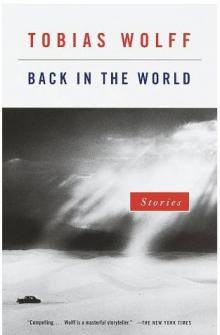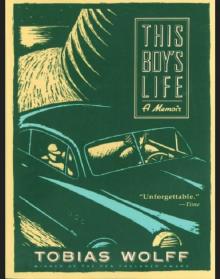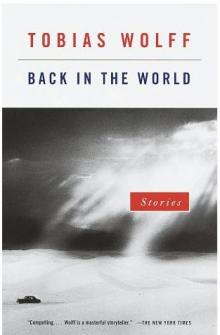- Home
- Tobias Wolff
The Night In Question Page 17
The Night In Question Read online
Page 17
Frank Senior said no to his son in everything, and Frances would say no to him in nothing. Frank was aware of her reluctance and learned to exploit it, most shamelessly in the months before his accident. He’d invaded her home, caused her trouble at work, nearly destroyed her marriage. To this day her husband had not forgiven Frances for what he called her complicity in that nightmare. But her husband had never been thrown across a room, or kicked, or slammed headfirst into a door. No one had ever spoken to him as her father had spoken to Frank. He did not understand what it was to be helpless and alone. No one should be alone in this world. Everyone should have someone who kept faith, no matter what, all the way.
“On the night in question,” Frank said, “Mike’s foreman called up and asked him to take another fellow’s shift at the drawbridge station where he’d been working. A Monday night it was, mid-January, bitter cold. Janice was at a PTA meeting when Mike got the call, so he had no choice but to bring Benny along with him. It was against the rules, strictly speaking, but he needed the overtime and he’d done it before, more than once. Nobody ever said anything. Benny always behaved himself, and it was a good chance for him and Mike to buddy up, batch it a little. They’d talk and kid around, heat up some franks, then Mike would set Benny up with a sleeping bag and air mattress. A regular adventure.
“A bitter night, like I said. There was a furnace at the station, but it wasn’t working. The guy Mike relieved had on his parka and a pair of mittens. Mike ribbed him about it, but pretty soon he and Benny put their own hats and gloves back on. Mike brewed up some hot chocolate, and they played gin rummy, or tried to—it’s not that easy with gloves on. But they weren’t thinking about winning or losing. It was good enough just being together, the two of them, with the cold wind blowing up against the windows. Father and son: what could be better than that? Then Mike had to raise the bridge for a couple of boats, and things got pretty tense because one of them steered too close to the bank and almost ran aground. The skipper had to reverse engines and go back downriver and take another turn at it. The whole business went on a lot longer than it should have, and by the time the second boat got clear Mike was running way behind schedule and under pressure to get the bridge down for the express train out of Portland. That was when he noticed Benny was missing.”
Frank stopped by the window and looked out in an unseeing way. He seemed to be contemplating whether to go on. But then he turned away from the window and started in again, and Frances understood that this little moment of reflection was just another part of the sermon.
“Mike calls Benny’s name. No answer. He calls him again, and he doesn’t spare the volume. You have to understand the position Mike is in. He has to get the bridge down for that train and he’s got just about enough time to do it. He doesn’t know where Benny is, but he has a pretty good idea. Just where he isn’t supposed to be. Down below, in the engine room.
“The engine room. The mill, as Mike and the other operators call it. You can imagine the kind of power that’s needed to raise and lower a drawbridge, aside from the engine itself—all the winches and levers, pulleys and axles and wheels and so on. Massive machinery. Gigantic screws turning everywhere, gears with teeth like file cabinets. They’ve got catwalks and little crawlways through the works for the mechanics, but nobody goes down there unless they know what they’re doing. You have to know what you’re doing. You have to know exactly where to put your feet, and you’ve got to keep your hands in close and wear all the right clothes. And even if you know what you’re doing, you never go down there when the bridge is being moved. Never. There’s just too much going on, too many ways of getting snagged and pulled into the works. Mike has told Benny a hundred times, stay out of the mill. That’s the iron rule when Benny comes out to the station. But Mike made the mistake of taking him down for a quick look one day when the engine was being serviced, and he saw how Benny lit up at the sight of all that steel, all that machinery. Benny was just dying to get his hands on those wheels and gears, see how everything fit together. Mike could feel it pulling at Benny like a big magnet. He always kept a close eye on him after that, until this one night, when he got distracted. And now Benny’s down in there. Mike knows it as sure as he knows his own name.”
Frances said, “I don’t want to hear this story.”
Frank gave no sign that he’d heard her. She was going to say something else, but made a sour face and let him go on.
“To get to the engine room, Mike would have to go through the passageway to the back of the station and either wait for the elevator or climb down the emergency ladder. He doesn’t have time to do the one or the other. He doesn’t have time for anything but lowering the bridge, and just barely enough time for that. He’s got to get that bridge down now or the train is going into the river with everyone on board. This is the position he’s in; this is the choice he has to make. His son, his Benjamin, or the people on that train.
“Now, let’s take a minute to think about the people on that train. Mike’s never met any of them, but he’s lived long enough to know what they’re like. They’re like the rest of us. There are some who know the Lord, and love their neighbors, and live in the light. And there are the others. On this train are men who whisper over cunning papers and take from the widow even her mean portion. On this train is the man whose factories kill and maim his workers. There are thieves on this train, and liars, and hypocrites. There is the man whose wife is not enough for him, who cannot be happy until he possesses every woman who walks the earth. There is the false witness. There is the bribe-taker. There is the woman who abandons her husband and children for her own pleasure. There is the seller of spoiled goods, the coward, and the usurer, and there is the man who lives for his drug, who will do anything for that false promise—steal from those who give him work, from his friends, his family, yes, even from his own family, scheming for their pity, borrowing in bad faith, breaking into their very homes. All these are on the train, awake and hungry as wolves, and also on the train are the sleepers, the sleepers with open eyes who sleepwalk through their days, neither doing evil nor resisting it, like soldiers who lie down as if dead and will not join the battle, not for their cities and homes, not even for their wives and children. For such people, how can Mike give up his son, his Benjamin, who is guilty of nothing?
“He can’t. Of course he can’t, not on his own. But Mike isn’t on his own. He knows what we all know, even when we try to forget it: we are never alone, ever. We are in our Father’s presence in the light of day and in the dark of night, even in that darkness where we run from Him, hiding our faces like fearful children. He will not leave us. No. He will never leave us alone. Though we lock every window and bar every door, still He will enter. Though we empty our hearts and turn them to stone, yet shall He make His home there.
“He will not leave us alone. He is with all of you, as He is with me. He is with Mike, and also with the bribe-taker on the train, and the woman who needs her friend’s husband, and the man who needs a drink. He knows their needs better than they do. He knows that what they truly need is Him, and though they flee His voice He never stops telling them that He is there. And at this moment, when Mike has nowhere to hide and nothing left to tell himself, then he can hear, and he knows that he is not alone, and he knows what it is that he must do. It has been done before, even by Him who speaks, the Father of All, who gave His own son, His beloved, that others might be saved.”
“No!” Frances said.
Frank stopped and looked at Frances as if he couldn’t remember who she was.
“That’s it,” she said. “That’s my quota of holiness for the year.”
“But there’s more.”
“I know, I can see it coming. The guy kills his kid, right? I have to tell you, Frank, that’s a crummy story. What’re we supposed to get from a story like that—we should kill our own kid to save some stranger?”
“There’s more to it than that.”
“Okay, then, make it a trainloa
d of strangers, make it ten trainloads of strangers. I should do this because the so-called Father of All did it? Is that the point? How do people think up stuff like this, anyway? It’s an awful story.”
“It’s true.”
“True? Franky. Please, you’re not a moron.”
“Dr. Violet knows a man who was on that train.”
“I’ll just bet he does. Let me guess.” Frances screwed her eyes shut, then popped them open. “The drug addict! Yes, and he reformed afterward and worked with street kids in Brazil and showed everybody that Mike’s sacrifice was not in vain. Is that how it goes?”
“You’re missing the point, Frances. It isn’t about that. Let me finish.”
“No. It’s a terrible story, Frank. People don’t act like that. I sure as hell wouldn’t.”
“You haven’t been asked. He doesn’t ask us to do what we can’t do.”
“I don’t care what He asks. Where’d you learn to talk like that, anyway? You don’t even sound like yourself.”
“I had to change. I had to change the way I thought about things. Maybe I sound a little different too.”
“Yeah, well you sounded better when you were drunk.”
Frank seemed about to say something, but didn’t. He backed up a step and lowered himself into a hideous plaid La-Z-Boy left behind by the previous tenant. It was stuck in the upright position.
“I don’t care if the Almighty poked a gun in my ear, I would never do that,” Frances said. “Not in a million years. Neither would you. Honest, now, little brother, would you grind me up if I was the one down in the mill, would you push the Francesburger button?”
“It isn’t a choice I have to make.”
“Yeah, yeah, I know. But say you did.”
“I don’t. He doesn’t hold guns to our heads.”
“Oh, really? What about hell, huh? What do you call that? But so what. Screw hell, I don’t care about hell. Do I get crunched or not?”
“Don’t put me to the test, Frances. It’s not your place.”
“I’m down in the mill, Frank. I’m stuck in the gears and here comes the train with Mother Teresa and five hundred sinners on board, whoo whoo, whoo whoo. Who, Frank, who? Who’s it going to be?”
Frances wanted to laugh. Glumly erect in the chair, hands gripping the armrests, Frank looked like he was about to take off into a hurricane. But she kept that little reflection to herself. Frank was thinking, and she had to let him. She knew what his answer would be—in the end there could be no other answer—but he couldn’t just say she’s my sister and let it go at that. No, he’d have to noodle up some righteous, high-sounding reasons for choosing her. And maybe he wouldn’t, at first, maybe he’d chicken out and come up with the Bible-school answer. Frances was ready for that, she was up for a fight; she could bring him around. Frances didn’t mind a fight, and she especially didn’t mind fighting for her brother. For her brother she’d fought neighborhood punks, snotty teachers and unappreciative coaches, loan sharks, landlords, bouncers. From the time she was a scabby-kneed girl she’d taken on her own father, and if push came to shove she’d take on the Father of All, that incomprehensible bully. She was ready. It would be like old times, the two of them waiting in her room upstairs while Frank Senior worked himself into a rage below, muttering, slamming doors, stinking up the house with the cigars he puffed when he was on a tear. She remembered it all—the tremor in her legs, the hammering pulse in her neck as the smell of smoke grew stronger. She could still taste that smoke and hear her father’s steps on the stairs, Frank panting beside her, moving closer, his voice whispering her name and her own voice answering as fear gave way to ferocity and unaccountable joy, It’s okay, Franky. I’m here.
Firelight
My mother swore we’d never live in a boardinghouse again, but circumstances did not allow her to keep this promise. She decided to change cities; we had to sleep somewhere. This boardinghouse was worse than the last, unfriendly, funereal, heavy with the smells that disheartened people allow themselves to cultivate. On the floor below ours a retired merchant seaman was coughing his lungs out. He was a friendly old guy, always ready with a compliment for my mother as we climbed past the dim room where he sat smoking on the edge of his bed. During the day we felt sorry for him, but at night, as we lay in wait for the next racking seizure, feeling the silence swell with it, we hated him. I did, anyway.
My mother said this was only temporary. We were definitely getting out of there. To show me and maybe herself that she meant business, she went through the paper during breakfast every Saturday morning and circled the advertisements for furnished apartments that sounded, as she put it, “right for our needs.” I liked that expression. It made me feel as if our needs had some weight in the world, and would have to be reckoned with. Then, putting on her shrewd face, my mother compared the rents and culled out the most expensive apartments and also the very cheap ones. We knew the story on those, the dinky fridge and weeping walls, the tub sinking through the bathroom floor, the wife-beater upstairs. We’d been that route. When my mother had five or six possibilities, she called to make sure they were still open and we spent the day going from one to another.
We couldn’t actually take a place yet. The landlords wanted first and last months’ rent, plus cleaning deposit, and it was going to be a while before my mother could put all that together. I understood this, but every Saturday my mother repeated it again so I wouldn’t get carried away. We were just looking. Getting a feel for the market.
There is pleasure to be found in the purchase of goods and services. I enjoy it myself now, playing the part of a man who knows what he wants and can take it home with him. But in those days I was mostly happy just to look at things. And that was lucky for me, because we did a power of looking, and no buying.
My mother wasn’t one of those comparison shoppers who head straight for the price tag, shaking their faces and beefing about the markup to everyone in sight. She had no great interest in price. She had no money, either, but it went deeper than that. She liked to shop because she felt at home in stores and was interested in the merchandise. Sales clerks waited on her without impatience, seeing there was nothing mean or trivial in her curiosity, this curiosity that kept her so young and drove her so hard. She just had to see what was out there.
We’d always shopped, but that first fall in Seattle, when we were more broke than we’d ever been, we really hit our stride. We looked at leather luggage. We looked at televisions in large Mediterranean consoles. We looked at antiques and Oriental rugs. Looking at Oriental rugs isn’t something you do lightly, because the men who sell them have to work like dogs, dragging them down from these tall teetering piles and then humping them over to you, sweating and gasping, staggering under the weight, their faces woolly with lint. They tend to be small men. You can’t be squeamish. You have to be free of shame, absolutely sure of your right to look at what you cannot buy. And so we were.
When the new fashions came in, my mother tried them on while I watched. She had once been a model and knew how to strike attitudes before the mirror, how to walk casually away and then stop, canting one hip and glancing over her shoulder as if someone had just called her name. When she turned to me I expressed my judgments with a smile, a shrug, a sour little shake of the head. I thought she was beautiful in everything but I felt obliged to discriminate. She didn’t like too much admiration. It suffocated her.
We looked at copper cookware. We looked at lawn furniture and pecan dining room sets. We spent one whole day at a marina, studying the inventory of a bankrupt Chris-Craft dealership. The Big Giveaway, they called it. It was the only sale we ever made a point of going to.
My mother wore a smart gray suit when we went house hunting. I wore my little gentleman’s outfit, a V-neck sweater with a bow tie. The sweater had the words Fraternity Row woven across the front. We looked respectable, as, on the whole, we were. We also looked solvent.
On this particular day we were touring apartments in the
university district. The first three we looked at were decent enough, but the fourth was a wreck—the last tenant, a woman, must have lived there like an animal in a cave. Someone had tried to clean it up but the job was hopeless. The place smelled like rotten meat, even with the windows open and the cold air blowing through. Everything felt sticky. The landlord said that the woman had been depressed over the breakup of her marriage. Though he talked about a paint job and new carpets, he seemed discouraged and soon fell silent. The three of us walked through the rooms, then back outside. The landlord could tell we weren’t biting. He didn’t even offer us a card.
We had one more apartment to look at, but my mother said she’d seen enough. She asked me if I wanted to go down to the wharf, or home, or what. Her mouth was set, her face drawn. She tried to sound agreeable but she was in a black mood. I didn’t like the idea of going back to the house, back to the room, so I said why didn’t we walk up to the university and take a look around.
She squinted up the street. I thought she was going to say no. “Sure,” she said. “Why not? As long as we’re here.”
We started walking. There were big maples along the sidewalk. Fallen leaves scraped and eddied around our legs as the breeze gusted.
“You don’t ever let yourself go like that,” my mother said, hugging herself and looking down. “There’s no excuse for it.”
She sounded mortally offended. I knew I hadn’t done anything, so I kept quiet. She said, “I don’t care what happens, there is no excuse to give up like that. Do you hear what I’m saying?”
“Yes, ma’am.”
A group of Chinese came up behind us, ten or twelve of them, all young men, talking excitedly. They parted around us, still talking, and rejoined like water flowing around a stone. We followed them up the street and across the road to the university, where we wandered among the buildings as the light began to fail and the wind turned raw. This was the first really cold day since we’d moved here and I wasn’t dressed for it. But I said nothing, because I still didn’t want to go home. I had never set foot on a campus before and was greedily measuring it against my idea of what it should look like. It had everything. Old-looking buildings with stone archways and high, arched windows. Rich greenswards. Ivy. The leaves of the ivy had turned red. High on the west-facing walls, in what was left of the sunshine, the red leaves glittered as the wind stirred them. Every so often a great roar went up from Husky Stadium, where a game was in progress. Each time I heard it I felt a thrill of complicity and belonging. I believed that I was in place here, and that the students we passed on the brick walkways would look at me and see one of themselves—Fraternity Row—if it weren’t for the woman beside me, her hand on my shoulder. I began to feel the weight of that hand.

 The Night in Question: Stories
The Night in Question: Stories In the Garden of the North American Martyrs
In the Garden of the North American Martyrs Back in the World: Stories
Back in the World: Stories This Boy's Life
This Boy's Life Old School
Old School In Pharaoh's Army: Memories of the Lost War
In Pharaoh's Army: Memories of the Lost War Our Story Begins: New and Selected Stories
Our Story Begins: New and Selected Stories The Barracks Thief
The Barracks Thief The Night In Question
The Night In Question In Pharaoh's Army
In Pharaoh's Army Back in the World
Back in the World